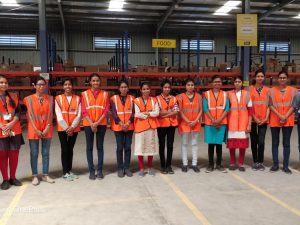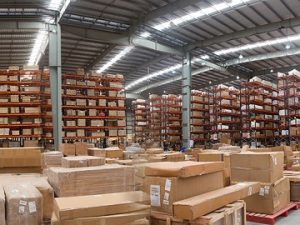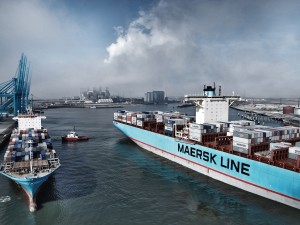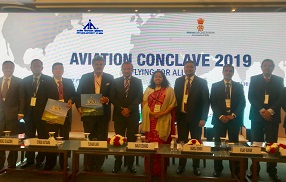The country’s first Multi-Skill Development Center (MSDC) in maritime logistics was launched by Nitin Gadkari, Minister of Shipping, Road Transport and Highways, Water Resources and Ganga Rejuvenation, at Bokadveera, Uran near JNPT, over video-conference from New Delhi. Allcargo Logistics will play a key role in overseeing the operations, maintenance, and management of the MSDC. The center is a collaborative initiative of the Ministry of Shipping (MoS) and Ministry of Skill Development and Entrepreneurship (MSDE) which has been set up under the Pradhan Mantri Kaushal Kendra (PMKK) programme to boost the efficiencies of maritime logistics in the country. “The youth living in the vicinity of ports need to be imparted with specific skill sets to boost their employment prospects in the country’s maritime trade sector. The MSDC is a reiteration of the government’s commitment to boost maritime logistics in the country under the ambitious Sagarmala programme,” stated Gadkari. “The logistics sector in the country is growing at an exponential pace and will require highly skilled manpower to run operations across key supply chain verticals. Allcargo is privileged to be associated with the MSDC initiative of the government and remains firmly committed to building the skill competencies of the youth and steering the country’s maritime logistics sector on a higher growth curve,” stated Shashi Kiran Shetty, Chairman, Allcargo Logistics.
Read More »IATA launches CEIV Fresh certification for transporting perishables
The International Air Transport Association (IATA) has launched a new industry certification, Center for Excellence for Perishable Logistics (CEIV) Fresh, to improve handling and transport by air of perishable products. The specific time and temperature requirements for food and plant products makes the handling and transporting of perishable products challenging. The CEIV Fresh programme meets these exacting requirements primarily based on IATA Perishable Cargo Regulations (PCR) which combine professional regulatory and operational input from industry and government experts. “Perishable goods are a growing market for air cargo. Ensuring that these delicate and short shelf-life products reach the customer unspoiled with minimal waste and loss is essential. Shippers will have assurance that CEIV Fresh-certified companies are operating to the highest quality and standards in the transport of perishable products,” said Alexandre de Juniac, IATA’s Director General and CEO.
Read More »India and Afghanistan open air freight corridor between New Delhi and Herat
India and Afghanistan have opened another air freight corridor connecting Herat to New Delhi to promote bilateral trade, bypassing Pakistan. The corridor was inaugurated just a few days after Afghanistan sent the first cargo shipment, carrying 200 kg of saffron and 1600 kg of Pistachio, to New Delhi from Herat in the first flight. India and Afghanistan established a direct air freight corridor connecting Kabul to New Delhi in June 2017 after a decision was taken in September 2016 in a meeting between Prime Minister Narendra Modi and Afghan President Ashraf Ghani. Since then, the corridor also expanded to the Kandahar-New Delhi sector. On February 24, Afghanistan started a new export route through Iran’s Chabahar port that marked the first end-to-end use of the trade route for Afghan exports. The Zaranj-Chabahar route allows Afghan goods to reach India without crossing the Pakistani territory. The Afghanistan Chamber of Commerce and Industries (ACCI) has said that Afghanistan’s economic dependency on Pakistan has gone down following the establishment of new alternative trade and transit routes with several countries, including an air corridor with India.
Read More »FSC Solutions introduces all-women-run distribution centre in Nagpur
Driving a change for the logistics sector, Future Supply Chain (FSC) Solutions has established an all-women-run distribution centre (DC) ‘Shakti’ in Nimji, Nagpur. The DC is fully equipped with Transportation Management System and Warehouse Management Systems software. FSC introduced a disruptive idea of an all-women distribution centre at Nagpur last year. The inspiration behind the initiative was a woman in-charge of their Bengaluru DC who impacted the entire productivity chain in a positive manner. P V Sheshadri, CEO, FSC Solutions said, “FSC has been providing job prospects in the rural and semi-urban areas with its expanding warehouse footprint. We operationalised an all women DC last year with an objective to create opportunities for the women in Nimji, Nagpur. We look forward to inducting more women in our warehousing facilities and be the flag bearer of this change.” Future Supply Chain has already initiated a step towards gender equality by showing no disparity between the wages earned by men and women.
Read More »Pepperfry’s Mumbai fulfilment centre gets ISO certifications
Pepperfry further strengthened its market leadership by announcing the receipt of International Organization for Standardization (ISO) certification for their Mumbai fulfilment centre. This makes it the first warehouse to be ISO-certified with three critical certifications in the country and the only one in the furniture and home segment in the country to attain this accreditation. The certification was bestowed upon the marketplace by Bureau Veritas. The company’s Padgha (Bhiwandi) warehouse spanning across 285,000 sqft received certification for ISO 9001:2015 (QMS- Quality Management System), ISO 14001:2015 (EMS- Environment Management System) and ISO 45001:2015 (OHSAS- Occupation Health Safety and Assessment Series). The ISO 9001:2015 certifies the high emphasis on quality and operating efficiency of Pepperfry Fulfilment Centre.
Read More »India ahead of China in emerging markets with greatest potential: Agility Logistics Index
In the survey which was a part of the 10th annual Agility Emerging Markets Logistics Index, India, China, Vietnam, Brazil and Indonesia are the countries seen as having greatest potential. India is the emerging market with the greatest potential, ahead of a slowing China, according to an annual survey of global logistics industry executives. In the Index itself, China remains atop the annual 50-country rankings and India is in second position, followed by United Arab Emirates, Indonesia, Malaysia, Saudi Arabia, Mexico, Qatar, Turkey and Vietnam. China, India and Indonesia rank highest for domestic logistics; China, India and Mexico are top for international logistics; and UAE, Malaysia and Qatar have the best business fundamentals. Andy Vargoczky, SVP Sales & Marketing Asia-Pacific, Agility Global Integrated Logistics, says, “The logistics industry’s optimism is based on what India has accomplished – the Goods and Services Tax and other reforms – and on what can still be done to create economic growth and prosperity.”
Read More »India’s export growth driven by the West: Maersk
According to the Q4 2018 trade report released by Maersk, India’s containerised trade with the world has grown steadily, recording an overall import-export trade growth of six per cent. Increasing demand for refrigerated cargo from India coupled with improved trade relations with China, with introduction of favourable trade policies, has driven exports to grow a healthy three per cent in Q4. The demand for India-made goods such as vehicles, cereals and rice supplemented by refrigerated cargo such as fish, seafood, vegetables and pharmaceuticals saw maximum growth in exports. Imports maintained a stable growth of nine per cent, largely driven by substantial inflow of metals and paper. Overall, the containerised trade witnessed stable growth withstanding the fluctuations of global trade tensions. Steve Felder, Managing Director, Maersk South Asia, said, “We witnessed a stable trade environment in the last quarter of 2018 due to base effects, weakening demand of goods in China, overall contraction in manufacturing around the world, and the global trade tensions between major economies. The stable growth in trade indicates that the economy has been able to sail through some of these challenges, including the impact of regulatory reforms such as demonetisation and implementation of GST.”
Read More »Air Cargo Policy discussed at Aviation Conclave
The recently-held Aviation Conclave of the Ministry of Civil Aviation and Confederation of Indian Industries (CII), in New Delhi, saw industry veterans and stakeholders discuss the Air Cargo Policy that was launched in January. Sharing his opinion on the policy, Tushar Jani, President, ACFI, said, “I think we need to plan our growth and it’s difficult to get into the day-to-day problems of simplification, infrastructure, and other issues. I would suggest that with the new National Air Cargo Policy, let’s make a design and decide what should be the blueprint for the air cargo infrastructure in this country. If we can achieve that, our infrastructure probably would be better than a lot of other places.” He added, “I commend Air India for its growth in cargo in the last 1.5 years, which is remarkable. I am sure that carriers, by going direct, have grown their cargo equally. Hence, we need to make a blueprint considering India will be connected directly with many destinations, and the traditional hubs in the Middle East may shift into the US, Europe, or the Far East.” He also said India could perform better in the value-added supply chain than even developed countries, because the labour here is intelligent and available, and the industry must take leverage here.
Read More »Logistics Policy must focus on federal structure and TFA: Samir Shah
“The draft Logistics Policy seems homogeneous in nature, however, it should keep the federal structure in mind,” says Samir Shah, Partner, JBS Group and Immediate Past Chairman, FFFAI. Shah reiterated that the differences in the country with diversity will have to be accepted. “Simultaneously, there should be separate logistics policies from all state governments as well. The logistics policy will have to be guided by Trade Facilitation Agreement (TFA), which is a well-structured document for an action plan on enhancing EXIM trade through effective EDI and Single Window Interface for Facilitating Trade (SWIFT) systems,” he added. Shah is also of the opinion that there are procedural errors about the calculation of logistics cost, which has been taken as 13-14 per cent of the GDP. It does not have a scientific basis as far as calculation is concerned, and it should be segregated commodity-wise.
Read More »Cold-chain infrastructure, need of the hour: PHD Conference
Highlighting the challenges and the way forward for the Indian cold-chain industry and to understand the impact of cold-chain systems in doubling farmers’ income, PHD Chamber of Commerce organised the national conference on Future of Cold-chain Infrastructure in India, in New Delhi. Anant Swarup, Joint Secretary (Logistics), Department of Commerce, Ministry of Commerce & Industry, Government of India, speaking at the event, said, “There is no integrated approach in the logistics industry and the government is trying to connect the dots. It is the government’s vision to double farmers’ income, and with the agri-export policy, we are trying to serve the objective.” He also claimed that the country’s shift from cold storage to cold-chain was a positive one. “It is time for industry stakeholders to step in and get involved with the challenges and solutions,” he added. Addressing attendees, Ashish Mohan Wig, Managing Director, National Horticulture Board, Ministry of Agriculture and Farmers Welfare, Government of India, said, “The industry is facing several challenges, from lack of quality warehousing infrastructure to connectivity issues. We talk about Skill India, but we are not looking into skilling in the warehousing industry,” he said.
Read More » Cargo Breaking News
Cargo Breaking News









